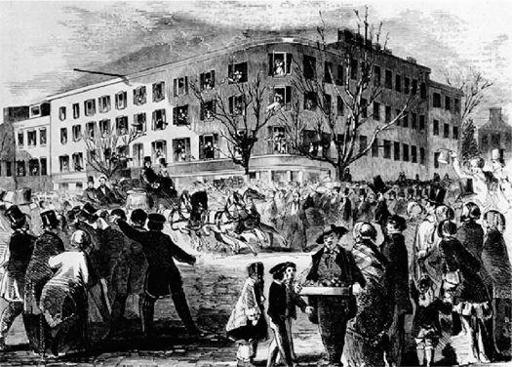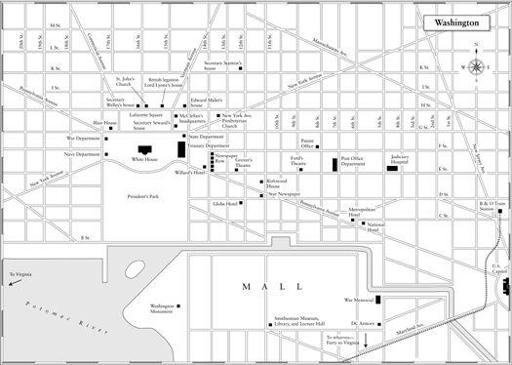A World on Fire: Britain's Crucial Role in the American Civil War (8 page)
Read A World on Fire: Britain's Crucial Role in the American Civil War Online
Authors: Amanda Foreman
Tags: #Europe, #International Relations, #Modern, #General, #United States, #Great Britain, #Public Opinion, #Political Science, #Civil War Period (1850-1877), #19th Century, #History

By 1857, Lyons was serving in the Florence legation, though still only ranked twenty-fourth out of the twenty-six secretaries in the service. This was a significant improvement in his fortunes, yet one that his father thought long overdue. Admiral Lyons’s beloved Edmund had been killed in 1855, in the waning months of the Crimean War, while carrying out his father’s order to attack the batteries of Sebastopol. The admiral’s health declined rapidly after Edmund’s death, but during his last years he continued to exert himself on Richard’s behalf, arguing his merits to former colleagues.
14
His efforts were vindicated after Lyons surprised himself and others with his elegant resolution of a dispute between the Neapolitans and the Sardinians before it escalated into an international controversy. Overnight, he became the Foreign Office’s preferred man for difficult situations. Admiral Lyons died in November 1858, a few days after learning of his son’s promotion to the Washington legation.
Lord Lyons would have arrived in Washington much sooner had not the settlement of the will detained him in England until mid-February 1859. There was a further delay caused by the Foreign Office’s parsimonious attitude to travel; Lyons had to cross the Atlantic on an inferior ship that burned through its coal halfway through the voyage. The crossing took a stomach-churning six weeks to complete instead of the usual ten days, sheer torture for a man who was terrified of water.
15
Lyons’s doubts about his fitness for his new post were shared by President James Buchanan, who resented the implication that Washington ranked next to Florence in importance—especially since 80 percent of Britain’s cotton supply came from America. The textile industry was one of the most important in Britain, and the cotton trade translated into a business worth $600 million a year, providing employment and financial security in England for more than 5 million men and women. This alone, believed Buchanan, merited a “first-rate man whose character is known to this country.”
16
Lord Lyons’s courtesy call to the American legation in London before he sailed had unwittingly confirmed the U.S. administration’s suspicion that the British Foreign Office was sending a nonentity. “Sensible,” “unobtrusive,” and “short” were the legation’s chief impressions of Lyons.
17
Buchanan’s misgivings about the quality of his new British minister were mild compared to Lord Lyons’s judgment of his new place of residence. Washington was not a city at all, in his opinion. “It is in fact little more than a large village,” he wrote to Lord Malmesbury, the Conservative foreign secretary, a month after he arrived, “and when Congress is not sitting it is a deserted village.”
18
The original political and strategic reasons for building the nation’s capital by the Potomac River had been obsolete for decades. The War of 1812 between Britain and America had demonstrated that the city could be invaded just as easily as New York. The Potomac had seemed to promise a thriving water trade, but the river proved too shallow for modern transports. Washington had been the geographic center when the Union consisted of only thirteen states; the country’s expansion to thirty-three now placed it on the periphery.
Washington lacked the literary salons, studios, universities, and conservatories that distinguished the capitals of Europe. The theaters relied on touring productions from New York; the shops were small and understocked. There was no commercial or manufacturing district such as those found in the new industrial cities, though the levels of violence, drunkenness, and corruption were not dissimilar. There were few cultural amenities save for the Smithsonian Institution, which had been established in 1846 with a bequest from the British scientist James Smithson. (Strangely, Smithson had never even visited the United States, let alone Washington.) The majority of the city’s permanent residents were civil servants, lawyers, or saloon keepers. When Charles Dickens traveled to the capital in 1842, he thought the city had “Magnificent Intentions” but little else. It had “spacious avenues, that begin in nothing and lead to nowhere” and “streets [a] mile long, that only want houses, roads, and inhabitants.”
19
Fifteen years later, these intentions remained unfulfilled. “Most members of Congress live in hotels or furnished lodgings,” wrote an English tourist. “In consequence, there is no style about the mode of living.… The whole place looks run up in a night, like the cardboard cities which Potemkin erected.”
20
The boundaries of Washington were still ragged and ill defined. A disagreement between the government and a local landowner had stranded the unfinished Capitol on top of a steep hill at the edge of town, facing the wrong way. Washington’s smart district lay two miles in the opposite direction, across marshland and noisome swamps that were breeding grounds for malaria in the summer. Elsewhere, the roads were still dirt tracks that frequently ended in piles of rubble or were interrupted by pastures. A pedestrian was in danger not only from one of the city’s unregulated hackney cabs, but also from being run over by wandering livestock. “On nine days out of every ten, the climate of Washington is simply detestable,” complained a British journalist. “When it rains, the streets are sloughs of liquid mud. In a couple of hours from the time the rain ceases, the same streets are enveloped in clouds of dust.”
21
The real political center of the city was Willard’s Hotel. Just a five-minute walk from the White House, this was where the “wire pullers,” the information seekers (and sellers), and those looking for employment seized the opportunity to mix with the temporary occupants of the Capitol. Here, on an average day, twenty-five hundred people passed through its doors. “Heavy persons, whom you have never seen before, with moist hands, eyes luminous with intoxicating beverages, break through the crowd and wildly shake your hand,” observed an anonymous journalist. “They convict you of having met them before somewhere. You say you have been there, whereupon you are instantly saddled with an acquaintance who grasps your hand fifty times a day, and whom you heartily wish at the—Antipodes.”
22
The hotel’s regulars downed cocktails in one of its many saloons or puffed themselves hoarse in the cigar bar, rendering real tourists appalled. “The tumult,” complained one English traveler, “the miscellaneous nature of the company, the heated, muggy rooms,” the revolting globs of tobacco spat on every surface, “despite a most liberal provision of spittoons,” made it “by no means agreeable to a European.”
23

Ill.2
The arrival of President Lincoln at Willard’s Hotel, February 23, 1861.
The British legation was established in Rush House at 1710 H Street, only a block from Lafayette Square, where the White House, the State Department, and many of Washington’s grandest mansions were clustered. Rush House was large enough to accommodate the chancery, the business end of the legation, and was sufficiently imposing to impart an air of consequence to diplomatic functions. Lord Lyons’s arrival created a stir similar to the excitement described by Jane Austen after the leasing of Netherfield Hall. “The gossips at once set about predicting that the newcomer would capitulate to the charms of some American woman, and speculation was already rife as to who would be the probable bride,” wrote Mrs. Clay, the wife of Senator Clement C. Clay of Alabama.
24
It was soon discovered, however, that Lyons, with his little round face and droopy eyes, was neither a Mr. Bingley nor a Mr. Darcy. Mrs. Clay received a “formidable card to the first Senatorial dinner given by the newly arrived diplomat” and decided this was her chance to collar him for a Southern belle. “I soon became emboldened to the point of suggesting to him the possibility of some lovely American consenting to become ‘Lyonised.’ His Lordship’s prompt rejoinder and quizzical look quite abashed me, and brought me swiftly to the conclusion that I would best let this old lion alone.”
25
Lyons had quoted
Tristram Shandy
at Mrs. Clay, but his arcane reference to Uncle Toby’s habit of sleeping “slantindicularly” not only passed over her head but made her wonder whether the new British minister was quite sane.
Mrs. Clay’s encounter with Lyons confirmed the general impression in Washington that he had replaced the Napiers but would never supplant them in the capital’s affections. Varina Davis, the wife of Senator Jefferson Davis of Mississippi, wrote that people thought Lyons “very taciturn and very stupid.”
26
Lord Napier gave his final speech in the United States on April 15, 1859. “I can never forget or requite the incessant kindness … offered to me by the American people,” he told an emotional audience at Astor House in New York. The following day, the press commented on the coincidence that Britain’s two most popular exports should make their farewells to America on the same night. The fifteenth also marked the last performance of the comedy
Our American Cousin.
It had run for 140 nights, a feat never before achieved in the history of American theater.
Lord Napier’s popularity had proved his undoing at the Foreign Office. “Napier is much too frank and too yielding to the Yankees,” the then prime minister, Lord Derby, had complained, “and they take advantage of him in every way.”
27
Napier’s friendship with Senator Seward was considered symptomatic of his mistaken priorities. The Foreign Office was not interested in having a minister who understood the Americans’ point of view. The choice of Lord Lyons to replace the adored Lord Napier—a decision that seemed incomprehensible to Washington—made perfect sense to London. Lyons’s views on America were generally in keeping with those of the Foreign Office: he was well disposed to its people, but he thought that democracy made the government weak and handed too much power to the violent and ignorant elements of society. If Lord Lyons were to feel concern over whether the Americans liked him, his superiors in London were confident such insecurities would be sublimated by his renowned sense of duty.
Lord Lyons soon realized that Napier had not been exaggerating when he described America as the “Castle Dangerous” of British diplomacy. His first request to the Foreign Office was for more staff; “considering … the very great importance of not giving offence and the extreme readiness of people here to take it, I think that few ministers abroad have so much need of a private secretary’s help as I have.”
28
Already it was apparent to him that the taking and giving of offense had become a reflexive habit in Anglo-American relations since the separation of 1775–83. For prudence’s sake, he had decided to “gratify their vanity by treating them in matters of form as [a] great people … as if they were really a considerable military power.”
29
But Lyons had made an error in assuming that he needed only to practice a little flattery to assuage America’s suspicions about Britain. Relations between the two countries had been bent and twisted by eighty-three years of wars, disputes, and reconciliations. “I hate England,” the American novelist Nathaniel Hawthorne had recently written from his consular post in Liverpool, “though I love some Englishmen, and like them generally.”
30
